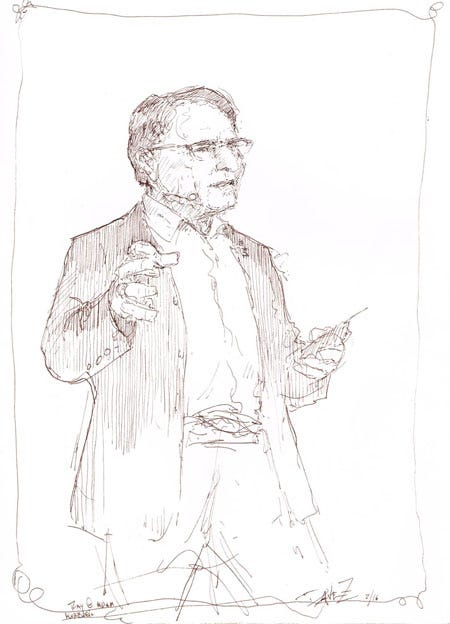February 17, 2016
We are at a stage in history where technologies can be applied to solve many of humanity's biggest problems. To drive enormous change, we need medical device innovators with an open source-ethos, and a willingness to rethink what is possible.
Brian Buntz
|
At MD&M West, Dave Zaboski who provided a keynote on February 9, sketched Ray Kurzweil, who gave a keynote address on the following day. |
"Technology is at its best when used to heal, un-hinder, and enhance human potential," says Dave Zaboski, an animator and classically trained painter who gave a keynote address on February 9 at MD&M West. And the ability of technologists to improve the lives of others is increasing dramatically. It's all about exponentially accelerating technologies empowering like-minded people aligned around a shared goal.
Consider for instance the Limbitless Solutions project, a student-led nonprofit based at the University of Central Florida, which distributes 3-D printed prosthetic arms to children for free. To date, the group has distributed approximately 2000 body-powered arms to kids in more than 40 countries.
"A lot of people don't know that behind the curtain, [all of us at Limbitless] are students. I know that when I first started, I had no idea that it was just college students getting together to create these arms for someone else," said Stephanie Valderrama, creative director at Limbitless, who shared the keynote stage with Dominique Courbin, director of production at Limbitless Solutions at MD&M Weston February 11. "It was beautiful to see that passion really change in our community, and it is also really beautiful to see that we are not all engineers as well: I am an artist, and we have people who are fashion designers. We are really open to have others help create these arms." The group has made all of its current prosthetic designs open source, and it plans on releasing upgraded plans with the community as well so that anyone can use or help create future iterations of the designs.
(Explore biomedical innovation at BIOMEDevice Boston, April 13-14, 2016.)
We are at a unique point in time when the divisions between traditionally separate fields are blurring, clearing the way for insights from niche disciplines to be applied to other fields. "We can now fully cross pollinate different disciplines to solve problems and challenges in a more holistic way," Zaboski said, who also teaches creativity at Singularity University, which Ray Kurzweil co-founded. "In archetypal terms, we have concluded our individual 'Hero's Journey,' our deep dive into the siloed specialty of a particular discipline, and we can now share our expertise to solve bigger problems in a more kindred quest."
This topic also emerged as a theme in Ray Kurzweil's keynote address at MD&M Weston February 12. Kurzweil anticipates continued advances in the field of artificial intelligence and machine learning to ultimately have profound cultural implications in coming decades.
At the very least, people should question whether the same types of problems that have affected humanity in the past will continue to do so in the future, Kurzweil said. While the earth's quickly growing population may be concerning from a resources standpoint, technology will ultimately be available to meet the needs of humanity in the future. "I think we will avoid the kind of problems we had before," Kurzweil said.
To illustrate this point, Kurzweil pointed to the history of the Internet. "If you remember the 1990s, there was the Internet craze, and if you had the URL dog.com, you were a billionaire. Then around the year 2000, people took stock and said, 'You can't really make money with these websites.' And we had the Internet crash," he recounted. "After the exponential growth continued, and we had a more mature understanding of what was required, you now have Internet companies like Google that are worth half a trillion dollars."
Kurzweil along with Limbitless team members Stephanie Valderrama and Dominique Courbin implicitly promoted a mindset of asking how technology can solve previously unsurmountable challenges. ""Dr. Kurzweil certainly has an embedded optimism in his talk and the work Dominique and Stephanie are doing is beautifully aligned with a whole view of technology. I truly believe that's the future," Zaboski said.
(Explore biomedical innovation at BIOMEDevice Boston, April 13-14, 2016.)
About the Author(s)
You May Also Like



